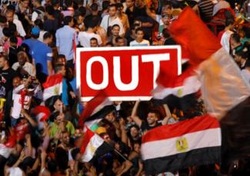 Apparently Black boys cannot be victims in the United States. Or so a South Florida court has coldly told the world. The 6-member jury accepted that Blackness 'reasonably' invokes fear & lethal responses to it. If so, where are Black boys to go to be safe? In the course of the trial, the judge forbade a discussion of Racial Profiling and thus eliminated the opportunity for it to be the trial it needed to be: one that challenges the construction of Blackness as dangerous. I have no illusions about a broken criminal justice system that daily destroys more than it builds, but even it needs to "perform" at times just to legitimate itself. No cover left for its blatant biases - blackness seems to pierce the blindfolds of America's Lady Justice.
5 Comments
 As we bear witness to one of the most dramatic junctures in Egypt's history, it is easy to take a stark position, with the revolution or against the coup. As we think about these events, we need to be much more militant (no pun intended) about sparing nuance from our analytical chopping block. Although there is something undeniably troubling about the coup, there seems to a reactionary defense of "electoral democracy" in Egypt that does away with a context wherein:
Having said all that, I do not think that the weeks and months ahead will produce automatic progress. To the contrary, absent the continuing vigilance of Egypt's people power, things can take a dramatic turn for the worse. Although the Egyptian street has not been naive in its planning and approach, it is now open to possibility that the military use this unprecedented popular showing as an instrument to reassert itself. A LOT has been written about Egypt in the past few days- and that's an understatement. To help you navigate through it here are my suggested readings: Down With Military Rule...Again?, Hesham Sallam Sallam unpacks the misleading binary between military coup and democracy as he places current events in Egypt into vivid context. The Seven Deadly Sins of the Muslim Brotherhood, Khaled Fahmy Fahmy explains how the Muslim Brotherhood has been its own worst enemy in its twelve-months in power. Why the Western Media Are Getting Egypt Wrong?, Khaled Shaalan Shaalan takes on simplistic and overeager media who have reduced current events in Egypt into a battle between the military and Islamists. Egypt's Democratic Outlaws, Abdullah Al-Arian Al-Arian inserts at least two new elements into the conversation worth considering: 1) the reaction to the Muslim Brotherhood's missteps are especially harsh precisely because of the Brotherhood's legacy within Egypt; and 2) the ousting of President Morsi has foreclosed, "possibly forever, the opportunity to witness the Muslim Brotherhood humbled through its preferred method of political contestation." For ongoing developments, I suggest following Jadaliyya’s Egypt Page.  Egypt is experiencing one of its most significant mass movement in recent history. The numeric and geographic magnitude is unprecedented as it surpasses the protests that removed former Egyptian ruler, Hosni Mubarak, from power in February 2011. On 1 July 2013, the military gave the Muslim Brotherhood leadership 48 hours to resign in a televised broadcast. From what could be gathered, protestors celebrated the threat, which if actualized, would amount to a military coup. The Brotherhood has rebuffed the threat, confident that the US supports its ongoing rule. It has also called upon its supporters to protest in support of President Mohammed Morsi and against the potential coup. Below is an excellent compendium of articles published by Jadaliyya's Egypt Team to help put this critical moment in context. For almost all Egyptians, 30 June 2013 is a day of celebration. Yet, while partisans of the Muslim Brotherhood are celebrating the one-year anniversary of Mohamed Morsi’s presidency, the twenty-two million Egyptians who signed on to the Tamarod Campaign petition--calling for early president election--are celebrating its end.
To shed light on this critical juncture in the living history of the January 25 Revolution, the Egypt Page Editors at Jadaliyya would like to bring to your attention to a collection of articles that grapple with the complexities of the lead-up to 30 June and what it means for the future of Egypt. FEATURED ARTICLES Context, Dynamics, and Significance of 30 June Protests Obsessed with Turkish Models in Egypt, by Hesham Sallam (published in partnership with Mada Masr) Tamarod: Egypt's Revolution Hones its Skills, by Adel Iskandar Gender and the People in Revolutionary Times, by Sherene Seikaly June to June: The More Things Change, The More They Remain The Same, by Robert Springborg Egypt’s Ultras: No More Politics, by Mohamed Elgohari Intimidation and Resistance: Imagining Gender in Cairene Graffiti, by Mona Abaza What Happens on 30 June? The Silver Lining, by Wael Eskandar Between Inaction and Complicity: The Shi‘a and the Brotherhood, by Sherene Seikaly and Adel Iskandar Back to the Margins, by Lina Attalah (published in partnership with Mada Masr) Nostalgia, Hope, and Fear on the Path to 30 June, by Mona Atia Should Egyptians Believe Morsi? by Heba F. El-Shazli Unpacking Anti-Muslim Brotherhood Discourse, by Mohamad Elmasry IN ARABIC الديمقراطية التشاركية والثورات العربية !بحثّاً عن حلف تاريخي جديد حديثي مع الشيطان - الجزء الثاني حديثي مع الشيطان For more on Egypt, visit our Egypt Page by clicking here. |
CurrentsThis is my semi-personal journal of travel, observations, & encounters! Archives
January 2017
Categories |
 RSS Feed
RSS Feed
